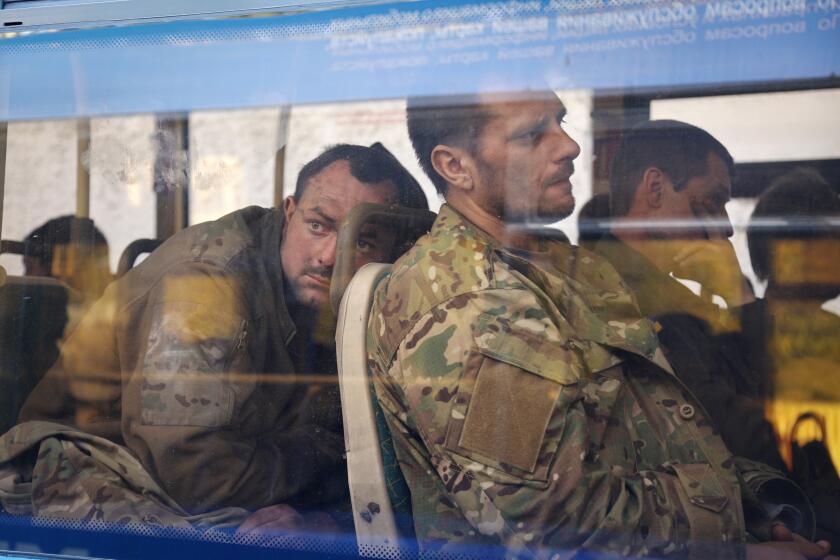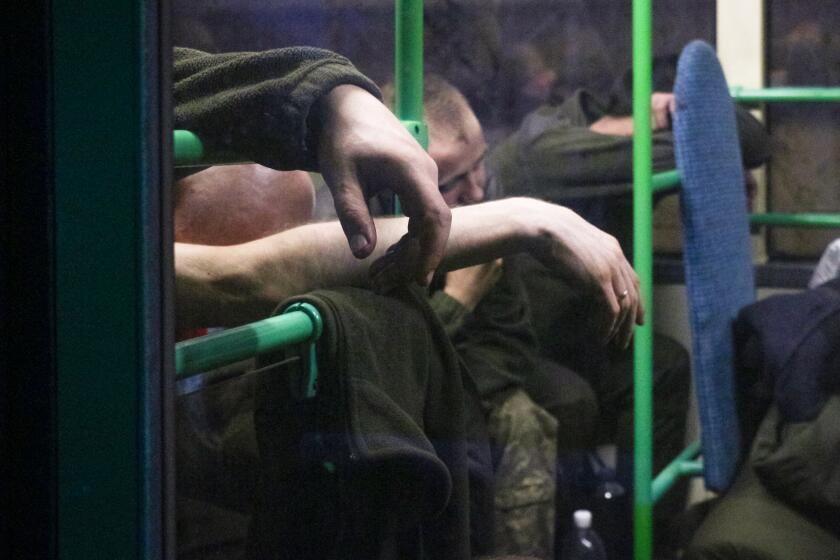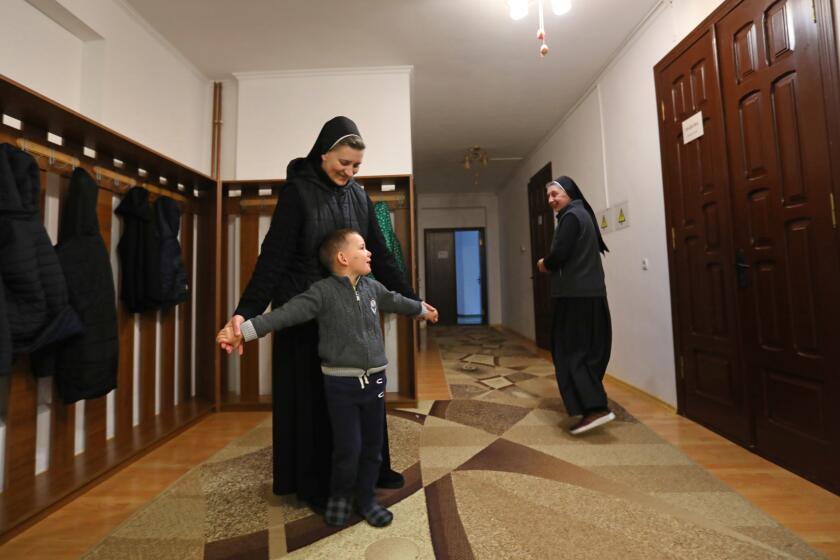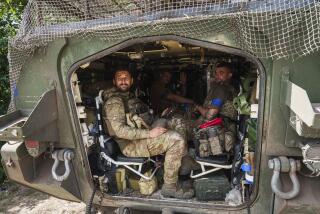Russia says hundreds of Ukrainian troops in custody; U.S. Senate approves $40 billion in new aid
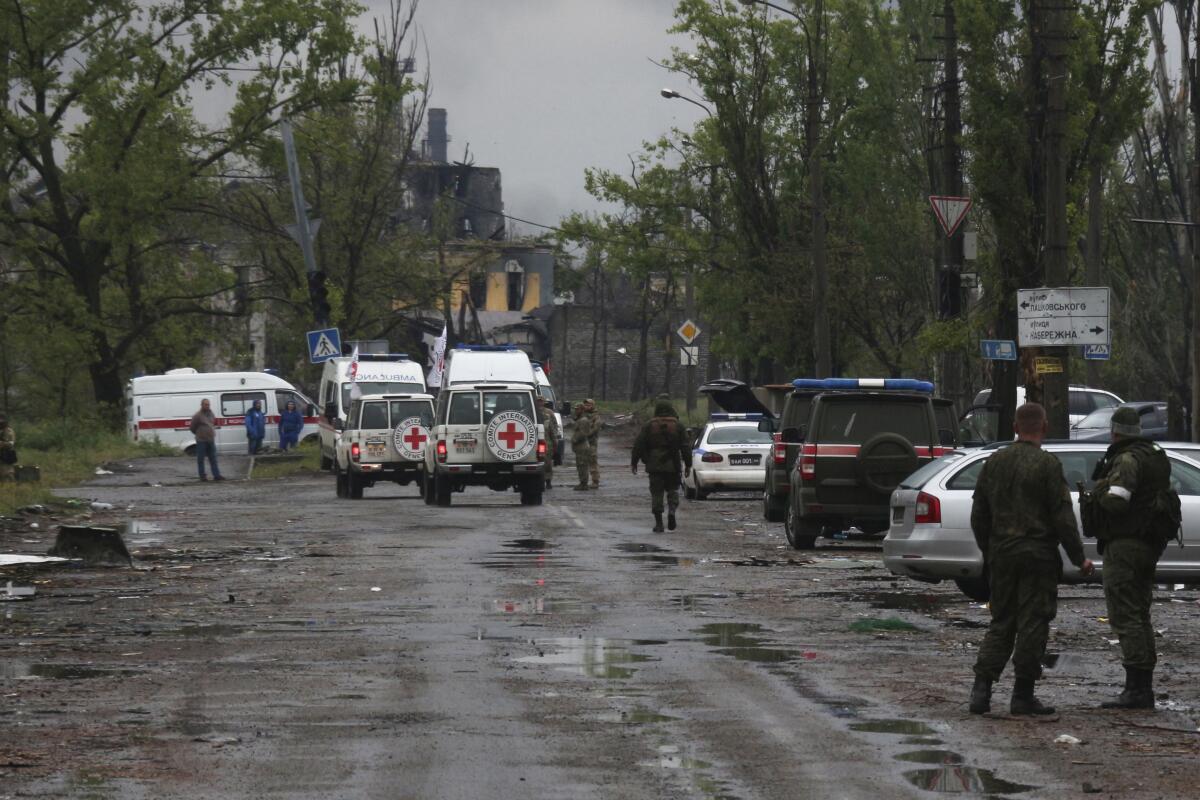
KYIV, Ukraine — Their fates unknown, more than 1,700 Ukrainian fighters were in Russian custody Thursday after they surrendered in the conquered city of Mariupol, Moscow said, even as Ukraine claimed battlefield gains elsewhere and heard a repentant confession from a Russian soldier in the country’s first war crimes trial.
Meanwhile, in Washington, the Senate gave final congressional approval to another massive package of aid for Ukraine. The $40-billion allotment includes weapons and humanitarian assistance. Heavy weaponry supplied by the U.S. and allies have made a significant difference in Ukraine’s underdog fight against its larger neighbor.
The Ukrainian soldiers who had defended the besieged Azovstal steel plant in Mariupol were taken to a pretrial detention center, Russian officials said. An undisclosed number of commanders remained inside the sprawling steelworks, which has become a symbol of resistance in the protracted war. The plant was Ukraine’s last redoubt in the devastated port city, whose capture has given Russia a key territorial gain along the southern coast.
The International Committee of the Red Cross said it had logged information on “hundreds” of Ukrainian prisoners of war from the Azovstal facility. The organization said its effort was part of an agreement between Ukraine and Russia that began when Ukraine gave up its fight at the plant Tuesday.
Other international groups expressed concern over what might happen to the prisoners, some of whom Russian officials have branded as “Nazis.” The fighters “must not be subjected to any form of torture or ill-treatment,” Amnesty International said.
The Ukrainian government has kept silent on the number of its fighters who have handed themselves over to Russian forces or who still remain inside the network of underground tunnels.
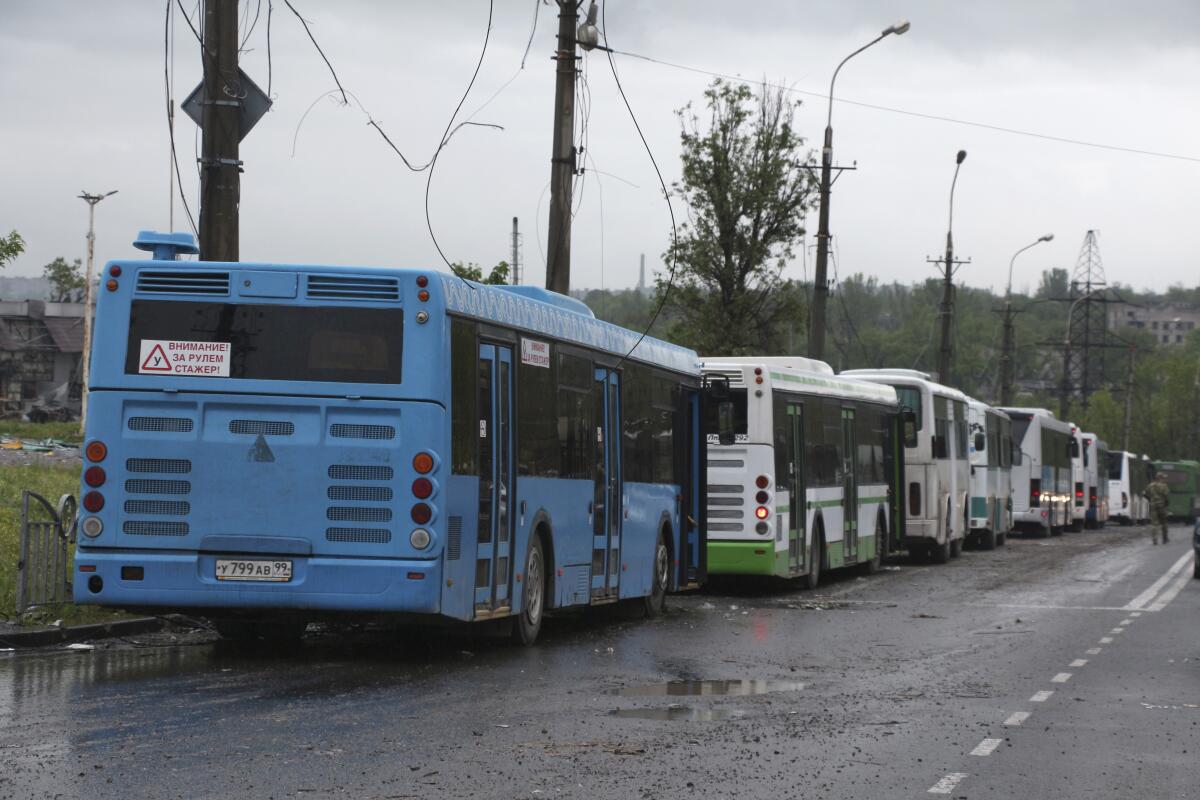
“The state is making utmost efforts to carry out the rescue of our service personnel,” said Oleksandr Motuzaynik, a Ukrainian military spokesman. “Any information to the public could endanger that process.”
The $40-billion U.S. aid package — the second multibillion-dollar contribution this year — won rare bipartisan support in Congress, although 11 Republicans voted against it. Most are allies of former President Trump. Senate Majority Leader Sen. Charles E. Schumer (D-N.Y.) lamented their position and accused them of following Trump’s “soft-on-Putin” playbook, referring to Russian President Vladimir Putin. President Biden was expected to quickly sign the legislation.
Separately, the U.S. released another $100-million tranche of the money approved earlier, bringing to nearly $54 billion the amount of aid committed to Ukraine since Russia invaded Feb. 24. It will include additional howitzers, antiartillery radar systems and other equipment, the Pentagon said.
In Kyiv, the Ukrainian capital, international journalists crowded Thursday into a courthouse where the war crimes trial of Russian Sgt. Vadim Shyshimarin continued. In the first such proceeding since the invasion, Shyshimarin, 21, has pleaded guilty in the deadly Feb. 28 shooting of an unarmed civilian in the northeastern Sumy region. Shyshimarin shot the Ukrainian, who was riding a bicycle, in the head.
In court, Shyshimarin said he was following orders and asked for forgiveness Thursday from the man’s widow, who said he deserved a life sentence for killing her husband.
Russia scores its first major win with the takeover of the Ukrainian port city of Mariupol. But will it change the course of the war?
Ukrainian officials say dozens of cases are being prepared by prosecutors out of thousands of war crimes they have identified. A second trial opened Thursday in Poltava, near Kharkiv,
of two Russian soldiers charged with firing rockets at civilian targets in the region. Both pleaded guilty, according to prosecutors quoted by the Ukrainian Interfax news agency. Moscow has denied committing atrocities. It is remarkable for war crime trials to start while a conflict is ongoing.
The developments — a major Ukrainian loss in the south and war crime trials in the midst of fighting — highlight the complex terrain of the war, which is now in its 13th week.
Ukrainian presidential advisor Mykhailo Podolyak, who has been a part of several failed peace talks with Russia, said that a cease-fire is no longer Ukraine’s goal. “Do not offer us a cease-fire — this is impossible without total Russian troops withdrawal,” he tweeted Thursday.
Meanwhile, the Ukrainian military said in a briefing that it had successfully countered Russian attempts to make gains along a 300-mile crescent-shaped battlefront in the Donbas, an eastern region that is the industrial heartland of Ukraine and home to Kremlin-financed separatists.
In London, an intelligence report by the British Defense Ministry said the Kremlin has begun a wave of reprisals against army officers considered to have performed poorly in Ukraine. These include Lt. Gen. Serhiy Kisel, suspended for failing to capture Kharkiv, Ukraine’s second-largest city, the report said.
As the war enters a ‘protracted phase,’ Ukrainian troops seized in Mariupol face interrogation while a Russian soldier pleads guilty to war crimes.
Russia has launched repeated assaults in the east and southeast over the weeks but currently occupies only a few major cities along the southern coast: Kherson, Melitopol and Mariupol. Several smaller villages are also under Russian control.
Serhiy Haidai, head of the regional military administration in the eastern Luhansk region — part of the Donbas — said shelling that started Wednesday in Severodonetsk continued into Thursday and has killed four civilians.
“The Russians used aircraft to destroy civilian objects in the areas of the settlements of Loskutivka, Katerynivka and Orikhove. They carried out assaults in the Ustynivka and Zolotoho-4 areas, but were unsuccessful,” Haidai said on the messaging app Telegram. He added that Russian forces had also cut electricity at a power substation, leaving the Lysychansk area “without light.”
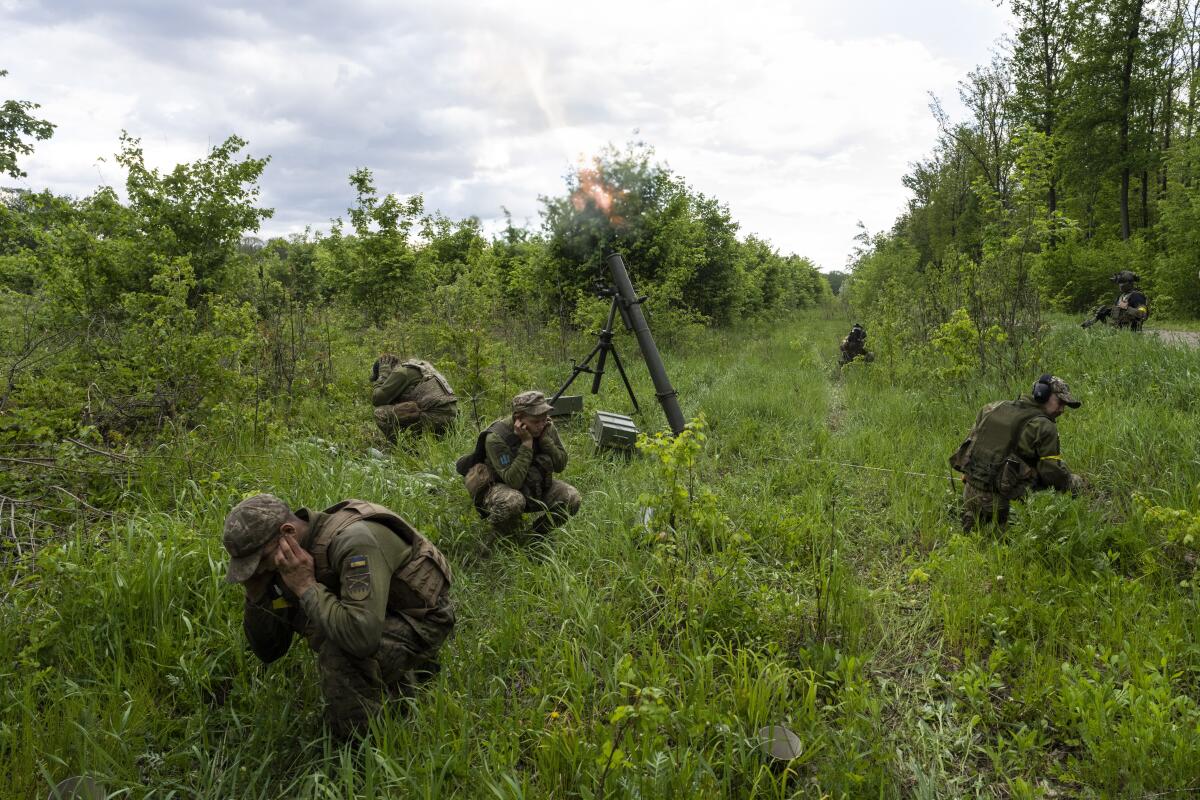
By contrast, in Kyiv, whose suburbs were once the target of constant Russian bombardment, a sense of normality is steadily being restored, with the reopening of foreign embassies and some local businesses. Still, many shops remained shuttered Thursday, and rush-hour traffic this week was well below prewar levels.
The U.S. Embassy reopened Wednesday — the same day that the Senate confirmed Bridget Brink as the new American ambassador to Kyiv. Brink is a veteran diplomat.
Also Wednesday, Russia announced that it would organize a media tour of Mariupol in an apparent victory lap, but Ukraine denounced it as a “disinformation” ploy and warned journalists against attending. Details on what ultimately happened were not immediately available.
In a tranquil Ukrainian monastery, dozens driven from homes by war find refuge. The nuns say they will offer shelter as long as it’s needed.
“The enemy’s primary goal is to discredit Ukraine’s role in this war,” Ukrainian Culture and Information Policy Minister Oleksandr Tkachenko said. “Currently, special ‘decorations’ for the foreign media have already been brought in: the fragments of Ukrainian ammunition collected from the occupied areas of Donetsk region, the crowd and actors who will be introduced as local eyewitnesses.”
The war, which has displaced more than 11 million Ukrainians and galvanized global powers against Putin, has wrought changes in Europe’s security architecture.
Sweden and Finland formally applied to join the North Atlantic Treaty Organization on Wednesday. The move, which was welcomed by the U.S. and several major NATO member states, reversed decades-long positions of military nonalignment for the two Nordic nations.
But the president of Turkey, which is a member of the alliance, reiterated his opposition Thursday to the two countries’ candidacy, throwing doubt on their applications.
Biden met Thursday with the leaders of Sweden and Finland in Washington. Afterward, he pledged the “full, total, complete” backing of the U.S. in the countries’ NATO bids and expressed confidence they would be approved quickly, despite Turkey’s objections accusing the Nordic countries of sheltering Kurdish separatists.
“They meet every NATO requirement, and then some,” Biden said in the Rose Garden. “And having two new NATO members in the High North will enhance the security of our alliance and deepen our security cooperation across the board.”
In an allusion to his predecessor, Trump, who sought to diminish the importance of NATO, Biden said the alliance today “is relevant ... more needed than ever.”
Putin has cited NATO’s long-term eastward expansion — in particular, prior Ukrainian interest in joining the alliance — as one of the reasons for his war.
He has also falsely claimed that the Kyiv government is run by Nazis.
McDonnell reported from Kyiv, Kaleem from London and Wilkinson from Washington.
More to Read
Sign up for Essential California
The most important California stories and recommendations in your inbox every morning.
You may occasionally receive promotional content from the Los Angeles Times.
